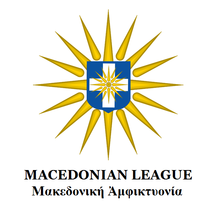Nikos Kotzias
Foreign Minister
Hellenic Ministry of Foreign Affairs
1st Vas. Sofias Av.
106 71 Athens, Greece
Dear Mr. Kotzias,
As the time has come that Greece and the Former Yugoslav Republic of Macedonia (FYROM) are close to signing a permanent treaty on the name of the latter, Greeks of Greece, but also the diaspora need your assurance that you are going to preserve Greece's present and future national interests in the form of inclusion in the treaty of all derivatives of the word "Macedonia" even as a composite name. One must discern the political, linguistic, and social norms in Yugoslavia, the parent state of the FYROM before proceeding to an agreement for agreement sake.
The Macedonian ethnicity was never explicitly recognized by the Marxist regime of the Federal People's Republic of Yugoslavia and later the Socialist Federative Republic of Yugoslavia. The recognition was gradual and implicit primarily by the people of Yugoslavia and then by the federative government of the constitutive republic of "Macedonia," who did not belong to any of the other ethnic groups inhabiting the republic. It was the result of a simple default. All derivatives of the word Macedonia evolved similarly.
The expression "Slavs of Macedonia" developed to "Macedonian Slavs" to "Macedonians", since they were the only inhabitants of Macedonia deprived of an ethnic appellation (Misirkov 1974, 159). To avoid any confusion, the Comintern used the expression Macedonian people (Македонский народ) as meaning the people of Macedonia regardless of ethnicity (Hristo Andonov-Poljanski 1981). Regarding the Macedonian nation (Mакедонская нация), Comintern recognized a state governed by the Internal Macedonian Revolutionary Organization (Comintern Resolutions of 1924 and 1934). It follows the model of the United Nations. i.e., countries; Comintern never recognized a community of descent.
But we have to ask the question, what kind of a final name is in the Greek national interests -- the dynamic, the stable, the solid one or the one struggling with all sorts of problems destabilizing the region? An unsuitable name could be the one struggling with all kinds of problems destabilizing the region. Another critical question is, what is the “new” Skopje is going do with the institutions its diaspora created and all of its past governments supported? This issue includes all institutions, not only within the country but especially abroad including but not limited those within Greece. It also requires a balanced and responsible approach.
Without the right approach, the current positive direction of the process of normalizing the relations between the two countries might turn into its contrary, leading to the undermining of regional stability. Existing instruments for supporting the balance must not be shattered but modified by the demands of the age. They must be utilized to strengthen security and stability and improve relations between states instead of being viewed as the veneer of a bad treaty. Greece has the normative leverage to enforce its final determination of a political or a practical decision with appropriate anticipatory consequences of a proposed course of action that would bear on concerns where the advantage is probably a factor.
Dear Sir,
The making of a stable self-controlling national culture and a peaceful region is undoubtedly a difficult task. Once the aftershock of the previous strategic culture begins to subside, the FYROM must start to reconsider the identity of its Slav populace and through public encouragement and education provided that the incentives become a top-down approach short and precise in no uncertain terms. In an eternal Macedonia, only one ethnicity can reside, the Greek.
Thank you for your time.
Marcus A. Templar
National Security Advisor
Macedonian League





 RSS Feed
RSS Feed